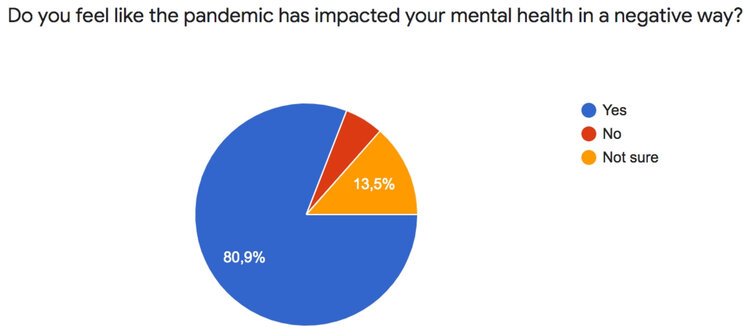Emma’s Update: What it’s like being a university student in a foreign country during the pandemic
Living through a pandemic is tough. Being a university student through a pandemic is tough. Being a university student in a foreign country through a pandemic is tough. “Make the most out of your university experience,” they said. “Go out. Work hard. Make mistakes. This is how you will make the best memories. These will be the best years of your life.” These last few words have been wandering through my mind for the past couple of weeks, and increasingly so as England announced a second lockdown a few days ago. Rumours began on Friday the 30th of October, were announced by the Prime Minister on Saturday the 31st, and implemented on Thursday the 5th of November for a period of four weeks. All of this happened very quickly. The relief we felt over the summer and coming back to university quickly made way for anxiety due to the uncertain and unknown nature of the evolution of the pandemic, and the repeating periods of lockdown will end up cancelling out this relief we so deeply long for as the threat of yet another lockdown is held over our heads. For example, as the English and French governments announced the new restrictions, they pretty much asserted these measures would be eased around Christmas time, only to be reinstated in the new year. As students, we can’t really predict what this means for us, whether our face-to-face classes will move online or not, whether university campuses will remain open…
I asked my friends what came to their minds first when I asked them the following question: “What is it like being a student during the pandemic (in a foreign country)?”
Some feel like their twenties are being stolen from them. Some see this time as a unique moment to re-center and take time for themselves. Some think about loved ones and wonder when the next time they will see them will be. Others worry about how the lockdown will affect their mental health. Some feel that the pressure is a lot heavier on 20 year olds. I feel like most adults disregard the impact the health crisis has on teens and young adults; as most of us are in school or university, they assume we have some sort of stability and something to keep ourselves busy. But we are the ones who will graduate in a world about as uncertain as it gets, and enter the job market that has been turned upside-down by the crisis the pandemic entails. All of this gives rise to a lot of stress and anxiety, and teen mental health has definitely taken a toll in the recent months.
I carried out some research among students who, for the most part, are aged around 20 years old and study in the UK or France. The survey revealed that the pandemic definitely has a negative impact on student mental health, according to over 80% of answers received (cf. graph 1). A majority of students have also reported that the second lockdown is tougher on their mental health than the first one (44.2%; cf. graph 2). Furthermore, the most common feelings they have been experiencing are sadness (66.3%), loneliness (66.3%), stress (59.6%) and anxiety (56.2%). Additionally, a study conducted by Santé Publique France, France’s national agency for public health, found that the number of people suffering from depressive disorders in the country doubled over the month of October (Santé Publique France 2020). This particularly concerns teenagers and young adults as about one out of three has reported suffering from depression.
The first lockdown back in March brought about a sort of thrill, a thrill of novelty, which compensated for the restlessness we were experiencing. However, since the UK has announced its second lockdown, I can definitely tell that this time around will be more challenging mental health-wise than the first time. Of course, when we look at the bigger picture, we definitely are not the worst off in this situation, but it is difficult to put things into perspective when it is impacting us so much.
My family is in France, quarantined too as the country entered its second lockdown a few days prior to England. They wanted to come visit me in a few weeks but can’t now, for obvious reasons. I usually go home halfway through the term but this term I can’t really do that, and probably won’t be able to do so next term either, as travellers entering the United Kingdom from France need to quarantine for fourteen days upon arrival and both England and France are in lockdown. I think this will make me appreciate the time I spend at home over the holidays even more, as I know that after that I probably won’t be able to see my family for a few months.
Nevertheless, I must admit that lockdown does have some not-so-bad sides (but I could never actually come around to saying I like this situation): I have learned to appreciate the little things more, such as walks. I’m lucky to have a few nice parks and open spaces around where I live, so I really enjoy walking around before sunset after a long day of studying. The weather in the UK has been surprisingly nice compared to other years which has really helped improve the situation. A friend and I have taken advantage of that and started a little ritual: a few times a week we get takeaway coffee and sit in the park, enjoying the sunshine and spending quality time together. I have learned to truly appreciate the people around me and the time we spend together. I have also picked up new hobbies, such as cooking and reading, which I never really took the time to enjoy before. Now that I spend most of my time at home, I really take the time to cook nice meals which helps take my mind off anything making me anxious and focus on something different than the news or my university deadlines.
My remote internship at Generation Human Rights has also helped keep me busy while doing something I thoroughly enjoy. I look forward to our weekly Zoom calls as I get to see different faces, talk about things unrelated to my classes, and appreciate all the great progress we have been making in our work, which has given me a lot of motivation in all domains, not just ones related to my internship.
The people at GenHR always have a positive mindset which makes our meetings a breath of fresh air which I am so thankful for! Lock down has also taught me to be grateful for what I have, such as a family and friends that look out for me and a nice comfortable flat. I am also glad I don’t live too far away from my family which reduces the feeling of alienation I could have had if I lived further away.
When the news of the second lock down came out, I actually made an inquiry with my university’s counseling services as I felt overwhelmed by the wave of anxiety the news brought. This is something that isn’t talked about enough and is too taboo, I feel, although it shouldn’t be. I usually have trouble talking about my stress and anxiety as it means I acknowledge it, but bottling up feelings is never the solution, even if it can be difficult to come to terms with this reality. Although we try our best to brush off these feelings of uneasiness, now that we know how hard isolation can be on our mental health we should really use this time as an opportunity to get in touch with our emotions in order to better deal with them and create a discussion around them, as it is no secret that many of us have been going through similar situations. If you are a high school or university student facing mental health challenges since the pandemic began, this is the time and place to get the conversation going on these overlooked obstacles. Follow the link below to tell us about how your school or university is handling the situation, what the situation is like in your area or country, talk about how you have been dealing with your conflicting emotions since the beginning of the pandemic, and share some tips and positive thoughts that have helped you overcome these emotions. The answers you will provide in the form are anonymous to make you more comfortable with opening up about how you have been feeling in the recent months. Take part in the conversation and contribute to normalizing mental health issues, especially during challenging times like these!
How have you been dealing with conflicting emotions since the pandemic began?
Share this article with your family, friends, and on your social media platforms to reach other students and get them involved in the discussion too!
Reference: Santé Publique France. 2020. “Point épidémiologique Covid-19 du 12 novembre : léger ralentissement de la circulation virale, les indicateurs toujours à de très hauts niveaux.” Santé Publique France. Last modified November 13, 2020. Assessed November 15, 2020. https://www.santepubliquefrance.fr/presse/2020/point-epidemiologique-covid-19-du-12-novembre-leger-ralentissement-de-la-circulation-virale-les-indicateurs-toujours-a-de-tres-hauts-niveaux





